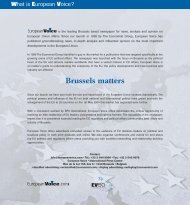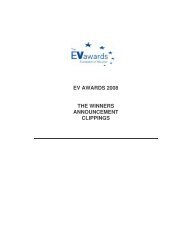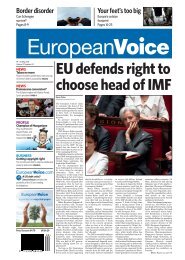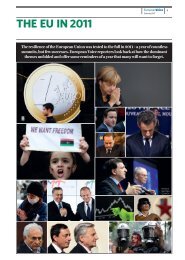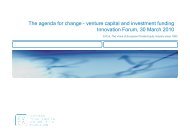special report - European Voice
special report - European Voice
special report - European Voice
You also want an ePaper? Increase the reach of your titles
YUMPU automatically turns print PDFs into web optimized ePapers that Google loves.
COMMENT<br />
30 May 2013<br />
11<br />
Edward Lucas looks at<br />
three oddities in the case<br />
of a US diplomat paraded<br />
as a spy by the Russian<br />
authorities<br />
The spy who bored us<br />
Here is the big news from<br />
the boiling cauldron of<br />
the East-West spy wars.<br />
Russia is being<br />
annoying; the United<br />
States barely notices and does not care.<br />
The details are familiar: Ryan Fogle,<br />
a third secretary at the US embassy in<br />
Moscow was arrested, carrying –<br />
supposedly – wigs, a compass, lots of<br />
money, a map of Moscow, and a “Dear<br />
friend” letter to a potential recruit in<br />
the Russian security service, the FSB.<br />
Much of this is unsurprising. So long<br />
as Russia spies on the US (which it<br />
does rather well), American spycatchers<br />
will want to stop them. It did<br />
this brilliantly when it recruited<br />
Alexander Poteyev, who was in charge<br />
of the ‘illegals’ (deep-cover agents) in<br />
north America, who were rounded up<br />
in the summer of 2010. They included<br />
the sizzling but trivial red-head Anna<br />
Chapman, and the far more important<br />
Donald Heathfield. (I write about this<br />
in my book “Deception”.)<br />
Other reasons to spy on Russia<br />
abound. It menaces its neighbours.<br />
Links between organised crime and<br />
officialdom are troubling. Islamist<br />
extremists in the north Caucasus and<br />
elsewhere can mount outrages abroad.<br />
Russia has provided some temporary<br />
and partial information on the latter to<br />
Western services, but if an FSB officer<br />
approached the CIA with the offer of<br />
more, in exchange for money, it would<br />
be worth taking a bit of a risk to find<br />
out how much he knew.<br />
Nor is it odd that the hapless Fogle<br />
got caught. Espionage involves lawbreaking<br />
and deceit, which is inherently<br />
risky. If it did not, it would not be<br />
espionage. Perhaps the source was a<br />
trap – a ‘dangle’ in espionage parlance.<br />
Perhaps Fogle’s tradecraft was sloppy.<br />
All spy operations seem brilliantly<br />
successful when they work and<br />
shamefully bungled when they do not.<br />
Espionage does involve occasional<br />
doses of public humiliation to the other<br />
side. America’s FBI released some<br />
embarrassing videos of Chapman and<br />
her colleagues. But nothing matches<br />
the gratuitous treatment meted out to<br />
Fogle and his embassy colleagues,<br />
‘spotlighted’ (in spy jargon) on Russian<br />
television. That – the first big oddity –<br />
had echoes of the iciest days of the<br />
Cold War. To add insult to injury,<br />
Russia named the CIA station chief in<br />
Moscow (a big breach of espionage<br />
protocol). News also leaked of the<br />
earlier expulsion of Thomas Firestone,<br />
a prominent American lawyer in<br />
Moscow, who formerly worked at the<br />
US embassy. He is a leading authority<br />
on official corruption in Russia.<br />
What is going on? One answer may<br />
be that Russia’s spy-catchers simply<br />
wanted to crow about a rare success.<br />
Another is that the whole affair fits the<br />
story that the Kremlin tells to its own<br />
people, of Russia as a besieged fortress,<br />
the opposition as the puppets of<br />
foreign spy services, and the West as<br />
duplicitous and incompetent.<br />
A second oddity is the Obama<br />
administration’s response to a series of<br />
gross provocations: a bored shrug. Its<br />
top priority is big cuts in nuclear<br />
weapons. A joint move on co-operation<br />
in applying international humanitarian<br />
law to cyberspace is expected soon.<br />
Such stuff matters. Spy games,<br />
ultimately, do not.<br />
The third oddity is the change in<br />
Germany, which for the first time since<br />
the era of Helmut Schmidt and Jimmy<br />
Carter is taking a tougher line on the<br />
REUTERS<br />
Kremlin than the US does. In past<br />
years, political pressure blocked<br />
intelligence and security officials from<br />
attacking Russian targets, unless<br />
organised crime was involved (in fact,<br />
even that seemingly limited field<br />
provided a rich harvest). But times<br />
have changed. Having caught Andreas<br />
and Heidrun Anschlag, two long-term<br />
Russian deep-cover spies, Germany<br />
now wants to trade them for jailed<br />
Western agents. Time to re-read those<br />
early novels by John le Carré.<br />
Edward Lucas edits the international section of<br />
The Economist.<br />
LETTERS<br />
Committed to transparency<br />
In a letter published in <strong>European</strong> <strong>Voice</strong> last<br />
week, (“Impossible to ignore lobbying<br />
concerns”, 23-29 May), Koen Roovers from<br />
ALTER-EU claims that EPACA, the<br />
<strong>European</strong> Public Affairs Consultancies’<br />
Association, fiercely opposes stronger rules<br />
on the lobbyist profession.<br />
An amazing statement given that<br />
EPACA, both in its written contribution to<br />
the Commission’s consultation on the<br />
revision of its transparency register, and in<br />
the two stakeholder meetings on the<br />
revision of the register, where ALTER-EU<br />
also participated, has stated our view that<br />
further amendments to the register and<br />
new requirements should be legislated and<br />
mandatory This has been our clear<br />
position for several years.<br />
Furthermore, we have suggested a<br />
number of ways to improve the accuracy of<br />
the data in the register and ideas on how<br />
to encourage even more organisations to<br />
sign up to it.<br />
EPACA represents a high proportion of<br />
the professional <strong>European</strong> Union public<br />
affairs services providers in Brussels. All<br />
our members have to abide by our code of<br />
conduct, which we have recently updated.<br />
It now explicitly requires our members to<br />
engage transparently with all stakeholders,<br />
not just the EU institutions, thus going<br />
farther than the transparency register code.<br />
We are an engaged partner in the<br />
transparency debate and we are committed<br />
to leadership in quality and professional<br />
standards in the public affairs community.<br />
ALTER-EU has a number of good ideas<br />
on how to improve the register and<br />
strengthen the rules. Unfortunately, they<br />
have chosen to position themselves in the<br />
debate as the voice against corporate<br />
lobbying, instead of being a voice militating<br />
for an effective framework for ethical and<br />
transparent lobbying. EPACA welcomes a<br />
constructive dialogue and we are convinced<br />
that if only ALTER-EU listened to what we<br />
say, instead of making it up, our two<br />
organisations would find a lot of common<br />
ground in the efforts to improve the<br />
transparency register.<br />
Karl Isaksson<br />
Chairman, EPACA<br />
WORDS<br />
<strong>European</strong> proverbs<br />
Kozla boysya speredi, konya – szadi, a<br />
likhogo cheloveka – so vsekh storon<br />
(Russian). Beware of the goat – from its<br />
front side, of the horse – from its back<br />
side, and the evil man – from any side.<br />
Zemheride yo urt isteyen, cebinde bir<br />
inek tas˛ır (Turkish). Who wants yoghurt<br />
in winter must carry a cow in his pocket<br />
(if you want something difficult, you must<br />
be willing to take the trouble to get it).<br />
Padres, primos e pombos. Os dois<br />
primeiros, não servem para casar. Os<br />
dois últimos só servem para sujar a casa<br />
(Portuguese). Priests, cousins and pigeons.<br />
The first two are not good to marry. The<br />
last two only make the house dirty.<br />
Yesli khochetsya rabotat' lyag pospi i<br />
vsyo proydyot (Russian). If you feel an<br />
urge to work, take a nap and it will pass.<br />
Kopeklerin duası kabul olsa gökten<br />
kemik yaǧardı (Turkish). If<br />
dogs’ prayers were accepted it would rain<br />
bones from the sky.<br />
Warm showers<br />
The Germans have pinpointed some<br />
particularly egotistic types:<br />
Warmduscher. Someone who is easy on<br />
himself (literally, warm showerer).<br />
Trittbrettfahrer. To take advantage of<br />
someone else’s efforts without<br />
contributing anything (literally, the<br />
person who rides on the stepping board<br />
of a bus or train without buying a<br />
ticket).<br />
Nose in the clouds<br />
It’s another short step from egotism to<br />
conceit:<br />
Nosom para oblake (Serbian). He's<br />
conceited, puffed up (literally, he's<br />
ripping clouds with his nose).<br />
Cuello duro (Spanish). A snob, stuckup<br />
(literally, hard or stiff neck – from<br />
keeping one’s nose in the air).<br />
You can respond, with comments,<br />
additions and, where necessary,<br />
corrections, through our website,<br />
www.europeanvoice.com, where our<br />
words column will regularly be found.<br />
Adam Jacot de Boinod is the author of “The<br />
meaning of tingo and other extraordinary words<br />
from around the world”, published by Penguin<br />
Books, and the creator of the iPhone app Tingo.




